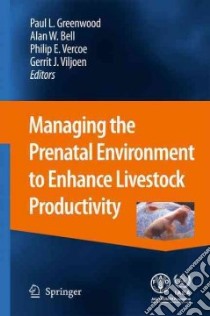Managing the Prenatal Environment to Enhance Livestock Productivity - 9789048131341
Un libro in lingua di Greenwood Paul L. (EDT) Bell Alan W. (EDT) Vercoe Philip E. (EDT) Viljoen Gerrit J. (EDT) edito da Springer Verlag, 2010
- € 227.40
- Il prezzo è variabile in funzione del cambio della valuta d’origine
Prenatal life is the period of maximal development in animals, and it is well recognised that factors that alter development can have profound effects on the embryonic, fetal and postnatal animal. Scientists involved in research on livestock productivity have for decades studied postnatal consequences of fetal development on productivity. Recently, however, there has been a surge in interest in how to manage prenatal development to enhance livestock health and productivity. This has occurred largely due to the studies that show human health in later life can be influenced by events during prenatal life, and establishment of the Fetal Origins and the Thrifty Phenotype Hypotheses. This book, Managing the Prenatal Environment to Enhance Livestock Productivity reviews phenotypic consequences of prenatal development, and provides details of mechanisms that underpin these effects in ruminants, pigs and poultry. The chapters have been divided into three parts: Quantification of prenatal effects on postnatal productivity, mechanistic bases of postnatal consequences of prenatal development and regulators of fetal and neonatal nutrient supply.Managing the Prenatal Environment to Enhance Livestock Productivity is a reference from which future research to improve the level of understanding and capacity to enhance productivity, health and efficiency of livestock in developing and developed countries will evolve. It is particularly timely given the development of molecular technologies that are providing new insight into regulation and consequences of growth and development of the embryo, fetus and neonate.
Informazioni bibliografiche
- Titolo del Libro in lingua: Managing the Prenatal Environment to Enhance Livestock Productivity
- Lingua: English
- Autori : Greenwood Paul L. (EDT) Bell Alan W. (EDT) Vercoe Philip E. (EDT) Viljoen Gerrit J. (EDT)
- Editore: Springer Verlag
- Collana: Springer Verlag (Hardcover)
- Data di Pubblicazione: 03 Gennaio '10
- Genere: MEDICAL
- Argomenti : Livestock Breeding Livestock productivity Prenatal influences
- Pagine: 298
- Dimensioni mm: 234 x 158 x 19
- ISBN-10: 9048131340
- EAN-13: 9789048131341


